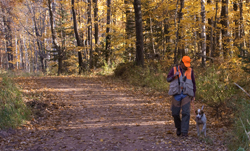Observations on using a Garmin Astro 220
 I bought a Garmin Astro 220 dog tracking unit in June and have been experimenting with different features and putting it through its paces. Using this unit in different dog training and hunting situations has given me some interesting and useful insight.
I bought a Garmin Astro 220 dog tracking unit in June and have been experimenting with different features and putting it through its paces. Using this unit in different dog training and hunting situations has given me some interesting and useful insight.
The Garmin Astro 220 is a high-sensitivity, GPS-enabled dog tracking system for hunters and sportsmen. This unique system pinpoints dog location—especially valuable when the dog can’t be seen or heard. The unit records the distance the dog has traveled and average speed. It is also a full-function GPS that can be used to navigate, mark vehicle location and record miles traveled by the hunter and total time out.
Flushes per hour or flushes per mile
Traditionally,
grouse hunters account for bird contacts in flushes per hour. I tried
something different. Using the Trip Computer feature of the Astro, I
tracked the number of miles I traveled, counted grouse flushes and then
computed grouse flushes per mile.
Another take on this
calculation is using the miles the dog has traveled compared to grouse
flushes. Is the dog that finds the most birds in the least miles
traveled the better bird dog? Certainly, it is more efficient!
Speed
Discovering
dogs’ average speeds in various terrains was enlightening. The first
thing to understand, though, is that the dog’s average speed is
calculated by dividing the miles traveled by the total elapsed time
without regard to time the dog is stopped on point.
Over
the course of a one-hour workout in fairly open, brushy terrain, my
dogs galloped 12 – 15 mph. Amazingly, my pace was 3 – 3.5 mph so the
dogs covered 4 – 5 times as much ground. In the woods, both speeds, as
expected, were slower. When I walked about 2 miles an hour, the dogs
galloped 5.5 to 7.5 mph. Also, my dogs were on point more often in the
woods, so the average speed was probably one or two mph faster than the
Astro calculated.
Putting those speeds in perspective, my dogs trot at about 8 – 9 mph when I condition them from a four-wheeler.
Fast or quick?
During
a day of guiding grouse hunts, I usually take three dogs and hunt each
separately for about two hours. Several times last fall, I started with
Shaq, a 54-pound setter that moves smoothly and easily through the
woods. Shaq is a medium-to-wide ranging dog and at times was 200 yards
away. His moving average was about 7 mph.
Often, Maggie
followed Shaq. Maggie is a 40-pound, hard driving pointer female that
rarely ranged farther than 100 yards but continually crossed the path
in front. Many hunters commented on how “fast” Maggie was compared to
Shaq. The Astro told me that Maggie was moving at only about 6 mph so
she perhaps was “quicker” but not faster.
For more information on the Astro, you can visit their website at www8.garmin.com/astro/




